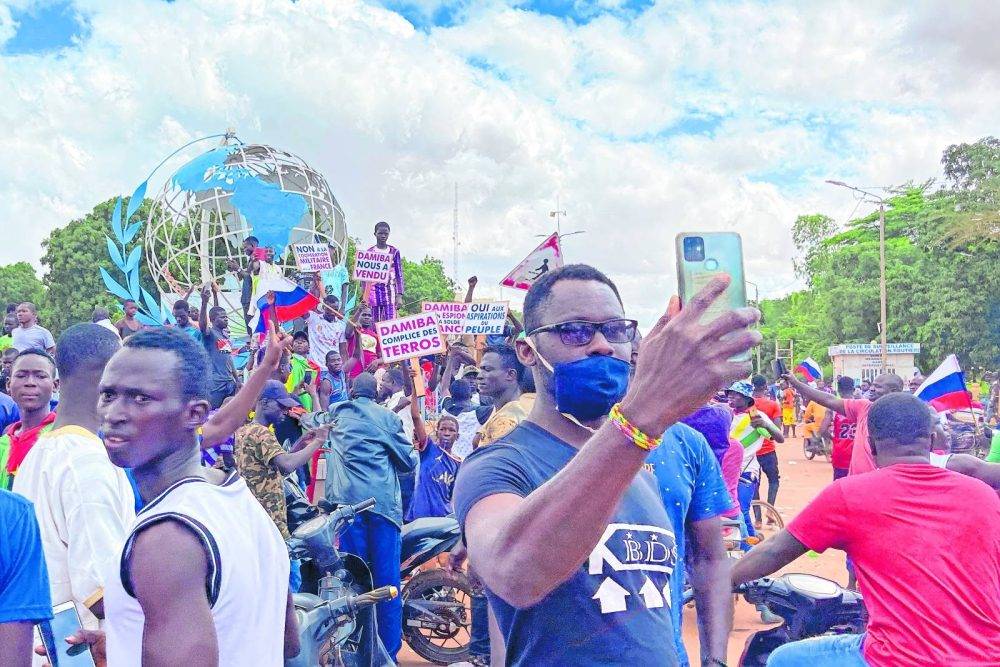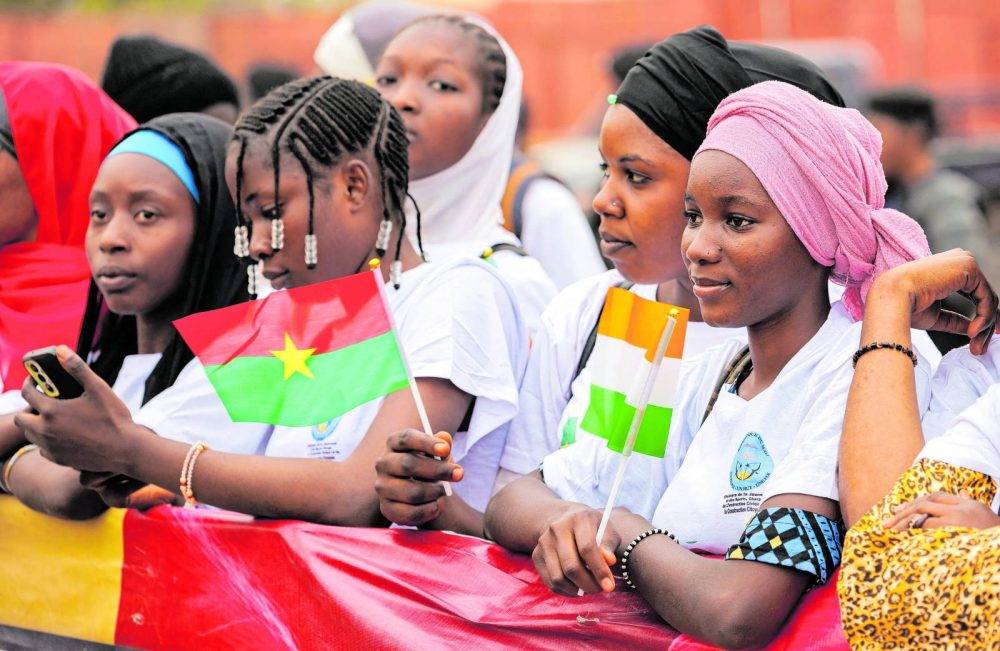
Discontent: Protesters carry Russian flags as they protest in Burkina Faso’s capital Ouagadougou outside the French embassy as unrest simmers. (AFP)
On 16 August, the Alliance of Sahel States, formed by Mali, Burkina Faso and Niger — all led by military juntas that withdrew from the Economic Community of West African States — celebrated its first anniversary. In recent years, military takeovers have increased in West Africa, erasing years of democratic progress.
These coups are rationalised as responses to insecurity and corruption, but they are increasingly primed by disinformation campaigns that secretly stoke false narratives to soften the ground for democratic backsliding. Foreign actors orchestrate nearly 60% of these campaigns and have an expanding arsenal of algorithmic tactics to distort information to their advantage.
Through social media manipulation and other foreign information manipulation and interference (FIMI) techniques, these campaigns inflame political discourse and frame democracy as a failed Western-imposed system while positioning authoritarianism as a more effective alternative.
Last month, a group of experts and stakeholders convened in Lagos, Nigeria, to take stock of this problem and strategise collaborative responses. Good Governance Africa participated on the back of a recent edition of its quarterly publication, Africa in Fact, which tackled artificial intelligence and the rise of disinformation.
The gathering of about 30 counter-disinformation researchers and civil society practitioners examined how FIMI contributes to democratic erosion in Africa and embraced a collective defence framework. Experts highlighted how disinformation campaigns — frequently originating from Russia and pro-Russian operatives (40% of known campaigns in Africa) — have intensified the spate of military coups, especially in the Sahel, and outlined how democracies must update and invigorate their information spaces for this new reality.
While democratic dividends and support in Africa outweigh autocratic ones, democracies must deliver tangible progress, including in the information space, to improve people’s lives and counter false narratives.
The Sahel region is a telling case of how disinformation can destabilise fragile democracies. In recent years, Islamist insurgencies, economic hardships and weak institutions have opened the door to a feeling of disaffection with democratic governments among some segments of society. Disinformation campaigns have taken advantage of these vulnerabilities, portraying democracy as inept, foreign and unable to address the region’s problems.
They also position the West as the source of these problems, exploiting resentment of French policies across much of francophone West Africa. Russia, for instance, has been linked to media outlets and social media accounts that clandestinely broadcast narratives of Western hypocrisy and exploitation. Russia’s tactics have also included amplifying terrorist propaganda against Sahel governments before the region’s military coups.
The campaigns, in turn, offer authoritarianism as a pragmatic and even necessary response to Africa’s complex problems. They have also grown to include claims of a “new world order,” where multipolarity, noninterference and the rejection of democratic governance models are promised to change the fortunes of African countries.
These messages resonate in some quarters of West Africa where citizens feel let down by their governments, powerless in the international system and disillusioned by the slow pace of democratic reforms. When democracy is perceived as a source of instability, the path to authoritarianism can seem less perilous, even desirable.
This message plays directly into the hands of authoritarian sympathisers, creating fertile ground for coups and delayed transitions back to civilian rule. Military juntas, once in power, often justify their takeovers by promising to restore order and independence from foreign influence, but their track records often suggest otherwise.
A recent investigative report shows that support for the Sahel juntas is dwindling because of their failure to deliver on promises, as well as the harsh tactics employed by Russian mercenaries against the civilian population.
Afrobarometer reports that Africans’ satisfaction with democracy has dropped from 50% in 2011 to 39% in 2023. Similarly, over the past decade, support for democracy has fallen by seven percentage points (although still the most popular system of governance), while opposition to military rule has weakened by 11 points.
These trends reflect a search for change and a resurrection of military rule’s reputation, driven partly by its promotion by disinformation networks.
Despite the problems of real-world democracies, the past three decades have shown that African democracies deliver better governance (particularly in government effectiveness, security and corruption control) than autocracies, which allows citizens in these systems to derive greater benefits from the state.
Democracies, though imperfect, provide a system where citizens have a voice in their governance, leaders are accountable and human rights are protected. Democratic governments, especially those that are inclusive and transparent, are better equipped to manage resources and deliver economic growth, services and security.
Moreover, democracies offer fundamental freedoms and rights that disappear under authoritarian regimes. Democratic principles such as liberty, equality and justice are essential to human dignity and are being eroded in Africa’s coup-hit countries. Although authoritarian regimes may offer short-term excitement through fast-paced decrees and displays of might, they do so at the cost of personal freedoms, political pluralism and human rights.

Over time, such systems breed discontent as citizens become increasingly aware of the limited effectiveness of authoritarian systems and the harsh rule they impose on the civilian population. By contrast, democracies allow for a more peaceful transfer of power governed by the rule of law and offer citizens a voice in decision-making.
To counter the growing appeal of authoritarian narratives, Africa and other democracies must reassert these core principles and re-equip their information sectors to reflect and enable these principles. But beyond rhetoric, democratic governments must deliver tangible results for their citizens.
Good governance, economic opportunity, social inclusion and accessible and accurate information are key to making the case for democracy. When citizens see their lives improve under democratic rule, the appeal of authoritarian alternatives diminishes.
The very nature of democratic governance depends on the ability of citizens to make informed decisions based on factual information. Put simply, information is the air democracies breathe.
One reason we trust democracy as a system of governance is the idea that it can deliver better decisions and outcomes than autocracy because the “wisdom of the crowd” outperforms any one individual. But these advantages quickly become vulnerabilities when “the crowd” is disinformed and displaced by inauthentic voices. Even advanced democracies grapple with countering disinformation without infringing on freedoms of speech and thought.
In Africa and elsewhere, strengthening democratic institutions must go hand in hand with securing the information space and orienting it toward constructive democratic exchanges. One way is through the fence framework, a ground-up strategy that involves creating protective barriers against disinformation and manipulation.
This framework involves three key steps: collecting robust data on disinformation (posts), building networks and collaboration across sectors (slats) and informing the public with targeted, trusted communication (signs). Examples from countries such as Taiwan and Sudan (before the current civil war) show that local actors, supported by shared knowledge and resources, are best placed to lead such efforts.
Beyond this, governments, civil society, the private sector and other stakeholders must work together to promote media literacy, regulate digital platforms and develop mechanisms to counter disinformation, acting as defenders of these shared spaces so that they are secure from interference.
Ultimately, democracy remains Africa’s best hope for good governance and the truth-based information spaces that bind its social contract. The moral, developmental and security advantages of democracy are clear. But they must be communicated effectively, especially in the face of well-funded and well-organised disinformation campaigns.
More importantly, the strongest argument for democracy comes when democratic governments deliver real, tangible benefits — such as supporting the development of healthy and robust information spaces — that improve and enrich the lives of their citizens.
Nnaemeka Ohamadike is a senior data analyst at Good Governance Africa. Mark Duerksen is a research associate at the Africa Center for Strategic Studies.